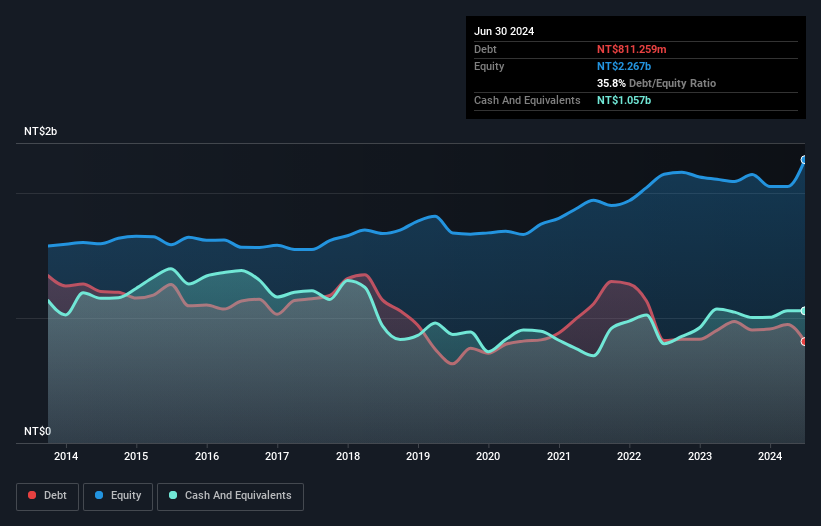David Iben put it well when he said, 'Volatility is not a risk we care about. What we care about is avoiding the permanent loss of capital.' So it seems the smart money knows that debt - which is usually involved in bankruptcies - is a very important factor, when you assess how risky a company is. We can see that Jung Shing Wire Co., Ltd. (TWSE:1617) does use debt in its business. But should shareholders be worried about its use of debt?
When Is Debt Dangerous?
Debt is a tool to help businesses grow, but if a business is incapable of paying off its lenders, then it exists at their mercy. Part and parcel of capitalism is the process of 'creative destruction' where failed businesses are mercilessly liquidated by their bankers. While that is not too common, we often do see indebted companies permanently diluting shareholders because lenders force them to raise capital at a distressed price. By replacing dilution, though, debt can be an extremely good tool for businesses that need capital to invest in growth at high rates of return. When we examine debt levels, we first consider both cash and debt levels, together.
Check out our latest analysis for Jung Shing Wire
What Is Jung Shing Wire's Debt?
As you can see below, Jung Shing Wire had NT$811.3m of debt at June 2024, down from NT$972.1m a year prior. However, its balance sheet shows it holds NT$1.06b in cash, so it actually has NT$246.1m net cash.

A Look At Jung Shing Wire's Liabilities
The latest balance sheet data shows that Jung Shing Wire had liabilities of NT$1.25b due within a year, and liabilities of NT$75.1m falling due after that. Offsetting these obligations, it had cash of NT$1.06b as well as receivables valued at NT$932.6m due within 12 months. So it actually has NT$666.2m more liquid assets than total liabilities.
This surplus suggests that Jung Shing Wire is using debt in a way that is appears to be both safe and conservative. Because it has plenty of assets, it is unlikely to have trouble with its lenders. Simply put, the fact that Jung Shing Wire has more cash than debt is arguably a good indication that it can manage its debt safely.
It was also good to see that despite losing money on the EBIT line last year, Jung Shing Wire turned things around in the last 12 months, delivering and EBIT of NT$30m. The balance sheet is clearly the area to focus on when you are analysing debt. But it is Jung Shing Wire's earnings that will influence how the balance sheet holds up in the future. So if you're keen to discover more about its earnings, it might be worth checking out this graph of its long term earnings trend.
Finally, while the tax-man may adore accounting profits, lenders only accept cold hard cash. Jung Shing Wire may have net cash on the balance sheet, but it is still interesting to look at how well the business converts its earnings before interest and tax (EBIT) to free cash flow, because that will influence both its need for, and its capacity to manage debt. Over the last year, Jung Shing Wire saw substantial negative free cash flow, in total. While investors are no doubt expecting a reversal of that situation in due course, it clearly does mean its use of debt is more risky.
Summing Up
While it is always sensible to investigate a company's debt, in this case Jung Shing Wire has NT$246.1m in net cash and a decent-looking balance sheet. So we don't have any problem with Jung Shing Wire's use of debt. There's no doubt that we learn most about debt from the balance sheet. However, not all investment risk resides within the balance sheet - far from it. For example Jung Shing Wire has 4 warning signs (and 1 which shouldn't be ignored) we think you should know about.
If you're interested in investing in businesses that can grow profits without the burden of debt, then check out this free list of growing businesses that have net cash on the balance sheet.
New: Manage All Your Stock Portfolios in One Place
We've created the ultimate portfolio companion for stock investors, and it's free.
• Connect an unlimited number of Portfolios and see your total in one currency
• Be alerted to new Warning Signs or Risks via email or mobile
• Track the Fair Value of your stocks
Have feedback on this article? Concerned about the content? Get in touch with us directly. Alternatively, email editorial-team (at) simplywallst.com.
This article by Simply Wall St is general in nature. We provide commentary based on historical data and analyst forecasts only using an unbiased methodology and our articles are not intended to be financial advice. It does not constitute a recommendation to buy or sell any stock, and does not take account of your objectives, or your financial situation. We aim to bring you long-term focused analysis driven by fundamental data. Note that our analysis may not factor in the latest price-sensitive company announcements or qualitative material. Simply Wall St has no position in any stocks mentioned.
About TWSE:1617
Jung Shing Wire
Engages in the manufacture and sale of magnet wires in Taiwan, Mainland China, Japan, the Philippines, and internationally.
Excellent balance sheet with low risk.
Market Insights
Community Narratives




